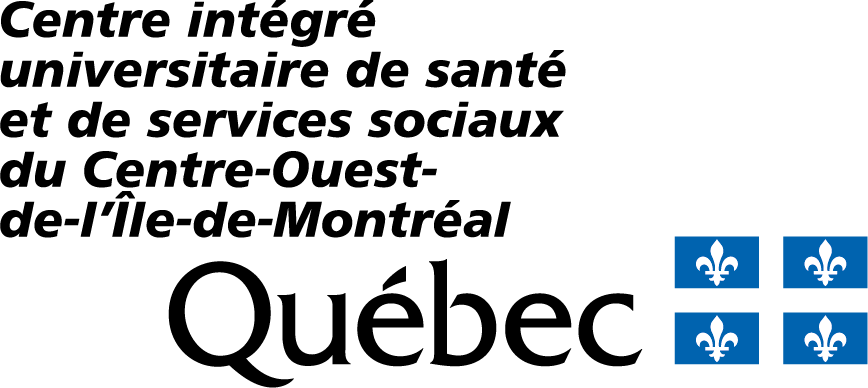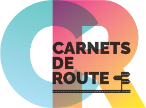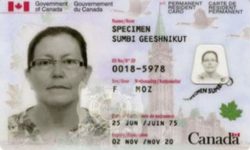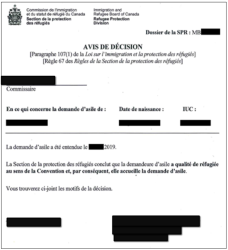Carnets de route contains information specifically aimed at refugees and refugee claimants, as well as the people assisting them. Carnets de route is intended to help you with the process of settling in when you arrive and during your first few years in Québec.
With Carnets de route, you will enjoy an engaging experience: reliable, organized and accessible information about Québec society, steps to take, to-do lists, timelines, summary diagrams and much more!
Select whether you would like to view the website in English or French, then answer the following three questions to be directed to the right information.

Your profile
Refugee Claims
Accepted Refugee Claims
Refused Refugee Claims
Refugees
Learning French
Key organizations and individuals
1. Updates – Learning French
The content of this section of Carnets de route was updated in January 2025. Some elements may have changed since then. If in doubt, consult the sources and resources in this section. You can also report any information requiring change through Technical Support. Update dates may vary by section.
2. Introduction
(Collectif Bienvenue, 2023c; Gouvernement du Québec, 2023ac, 2024; MIFIMinistère de l’Immigration, de la Francisation et de l’Intégration (du Québec) , 2023, 2024b; Ville de Sherbrooke, 2023d)
French is the official and most widely spoken language in Québec. Learning French will help you settle in and interact more easily with the people you meet.
“It’s easy to find work in Saint-Hyacinthe. But if we want interesting work that allows us to build a future we love, we need to speak French. Learning French is very important.” – Carolina M.
2.1 Types of courses
2.1.1 Government courses
Many institutions and organizations throughout Québec offer French courses.
These courses are free and you may be eligible for financial assistance to take these courses. However, you may have to pay for some school materials.
Full-time and part-time courses are available in person or online. Different levels of French are taught. For people with few years of schooling, “alpha-francisation” (Literacy and French classes) allows to learn French and master the basics of reading and writing.
2.1.2 Alternatives
Some community organizations also offer French courses or workshops that are not recognized by the government. This can be an option if you are unable to take French courses offered by the government to start learning or improving your French.
To find French courses in your city:
211
Multilingual – Information and referral service for social and community services
Classes and Workshops – The Welcome Guide – Welcome Collective
Greater Montréal – Affordable language classes and workshops
You can also take French courses at CEGEPs and universities; however, these courses cost money. You may qualify for financial assistance to pay for them. Contact the educational institution that you are interested in for more information.
You can also practise your French by participating in workshops and discussion groups and by volunteering, especially at community organizations. You can also use language learning apps like Duolingo and Babbel.
There are many ways to learn and practise French. Find what suits your needs, be creative and don’t get discouraged!
2.2 For more information
Information about learning French from the Government of Québec Learn French | Government of Québec
Learning French – Francisation Québec
Application for Government of Québec French courses
Most website in French only
3. Apprendre le français platform
(Collectif Bienvenue, 2023c; Gouvernement du Québec, 2023f, 2023ac, 2024)
Use the Apprendre le français platform to apply for admission to the free for French courses offered by the Government of Québec and manage your student profile.
Learning French – Francisation Québec
Application for Government of Québec French courses
Most website in French only
If you need help, you will find videos and an FAQ section (in French, English and Spanish) at the bottom of the home page.
Your host organization or sponsorship group will help you apply for admission and for financial assistance.
3.1 Application for admission
Regardless of the type of French course you choose, you will need to apply for admission using the Apprendre le français platform. If you already have an account on the Arrima platform, you can use the same username and password to log on to Apprendre le français.
If applying through Apprendre le français doesn’t work, use the Arrima platform: Arrima – Government of Québec or the following link: Application for admission to French courses – MIFI
You will need your MIFIMinistère de l’Immigration, de la Francisation et de l’Intégration (du Québec) personal reference number. You can find this number on your CSQQuébec Selection Certificate , CAQQuébec Acceptance Certificate or any other personal communications sent to you by the MIFIMinistère de l’Immigration, de la Francisation et de l’Intégration (du Québec) . Your permanent resident card may also be accepted.
You will need to take additional steps to apply for financial assistance for full-time courses or for reimbursement of admissible expenses. See Application for financial assistance.
After you apply for admission, check your online account for confirmation of your:
- Registration from the educational organization
- Course start date and location
- Eligibility for financial assistance
If your application has been rejected, you can ask for the decision to be reconsidered: Le MIFI à l’écoute | Government of Québec [French only]
3.2 Support
If you are getting help to register for your French courses, for example from a community counsellor, you must fill out the form ME-0002-2304 Authorized person or Proxy – Francisation Québec and submit it using the Apprendre le français website. This will let the person helping you access your information and represent you.
3.3 Communicating with the MIFIMinistère de l’Immigration, de la Francisation et de l’Intégration (du Québec)
You will get messages about your French courses through your profile on the Apprendre le français platform.
If you need help with your application for admission or other procedures during French courses, you can also contact the MIFIMinistère de l’Immigration, de la Francisation et de l’Intégration (du Québec) :
MIFIMinistère de l’Immigration, de la Francisation et de l’Intégration (du Québec) – Government of Québec
If your email is linked to your Apprendre le français profile, make sure to check it regularly and update your email address if needed.
4. Full-time or part-time courses
(AGIR Montréal, 2023; Collectif Bienvenue, 2023c; Gouvernement du Québec, 2023ac, 2024; Jobin-Théberge & Richard, 2020a; Gervais, 2023)
You must be aged 16 or over to take these courses.
The majority of full- and part-time courses are taught in person, but they may also be taught remotely (for example, on Teams).
These classes are for beginner and intermediate students. If you already have some knowledge of French, you will be assessed shortly after your application for admission to determine which course is right for you.
Note that you will have to take tests and exams during your French course. If you feel that your test results do not reflect your French language skills, you can ask the organization to review your grades.
4.1 Course duration and frequency
You can choose between full-time and part-time courses.
Duration and frequency of full-time courses:
- Monday to Friday during the day
- Between 25 and 30 hours of lessons per week
- Approximately 10 weeks
- Multiple sessions throughout the year
Duration and frequency of part-time courses:
- Generally during the day, evenings or weekends
- Between 4 and 24 hours of lessons per week
- Approximately 10 weeks
- Multiple sessions throughout the year
4.2 Course location
Courses may be held at:
- An educational institution (adult education centre, CEGEP, university, etc.)
- A community organization
- Remotely over live videoconferencing with a teacher (for example, on Teams).
4.3 Responsibilities
Attending these courses is compulsory. You may lose access to your courses and financial assistance if:
- You have unjustified late arrivals or absences (note down the maximum number of days you can be absent during the term and the accepted reasons for an absence).
- You behave disrespectfully toward others or your environment (insults, discrimination, breaking equipment, etc.).
See Right to non-discrimination in the Rights and Protections section for more information on the laws and charters that protect all people in Québec against discrimination.
You may have to miss some French classes to take care of your refugee claim, for example for an appointment with your lawyer. If you have an important appointment, talk to your teacher and ask the person you are meeting with to give you a note justifying your absence.
If ever you experience difficult situations in class because of your sexual identity, ask your teacher, a staff member or a community counsellor you trust for support.
5. Online courses
(Collectif Bienvenue, 2023c; Gouvernement du Québec, 2023ac, 2024; MIFIMinistère de l’Immigration, de la Francisation et de l’Intégration (du Québec) , 2021)
Online courses are also an option.
To take these courses, you must:
- Be aged 16 or older
- Have access to a computer and the Internet
- Have a camera and microphone (highly recommended)
You can register for these courses via the Apprendre le français platform.
If you already have some knowledge of French, you will be assessed shortly after your application for admission to determine which course is right for you.
The hours, times and frequency of courses may vary depending on the school and your schedule. Online courses are free, but no financial assistance is offered.
Here are the different options for online courses:
6. Financial assistance
(MIFIMinistère de l’Immigration, de la Francisation et de l’Intégration (du Québec) , 2023, 2024a)
As a refugee claimant, you are not eligible for financial assistance or reimbursement of expenses for your French courses.
To encourage newcomers to learn French, the Government of Québec may provide financial assistance or reimburse daycare and transportation expenses under certain conditions. For example, you cannot receive financial assistance if you or your spouse is receiving social assistance.
You may also receive employment assistance benefits under the Mesure de formation de la main-d’œuvre (French only – Labour Force Training Measure), for example if you are taking French courses to find a job: Training on How to Find a Job | Government of Québec. For more information, contact your nearest Services Québec office.
To-do list
See the Learning French section of the Carnets de route website for more details about the application for admission using the Apprendre le français platform and applying for financial assistance
- Consult the French courses offered on the Government of Québec website
- Apply for admission for the course using the Apprendre le français platform
Start your French course
Start date of your French course:Find out about the absence policy
- Practise French outside the classroom
Participate in workshops and discussion groups
Volunteer
Use an app
Report a change of address or email as soon as possible: see the Read This Information First section


